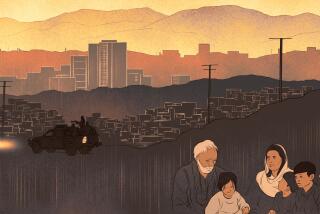Who’s watching the watch list?
- Share via
The administration delivers the message relentlessly: There will be another terrorist attack; Americans will die. Privacy and individual rights are the cost of minimizing the likelihood of this happening. If we hassle a million innocent travelers on the suspicion that one may be legitimately suspect, that is the price of security. I know this argument in the most intimate way, because for several months now the Transportation Security Administration has listed me, or someone, or many people with my name, on its National Watch List. The TSA uses only first name/last name -- in my case, “John Johnson” -- “Fenton” is my middle name.
In the months since I learned I am on the list I have flown several times, and -- so far -- my greatest inconvenience consists of being denied use of the machines that dispense automatic boarding passes. Instead, I must wait in line for a clerk.
By now I anticipate the situation, obediently line up, and watch for the clerk to react as I’m fingered by the list. After an ID check, I’ve been allowed to proceed, although some make clear their feeling that if the law has turned its spotlight on me then I must have done something wrong, and the sooner I’m sent to Guantanamo Bay the better.
That’s a small price to pay in an era of international terrorism, I would say, except for my persistent unease at being a suspect, a name on a list whose logic and standards are impossible to uncover.
I have visited the TSA website, where I was informed that on submission of notarized copies of my birth certificate, my passport and my driver’s license, I might find it easier to proceed through airport security -- but that I will not be removed from the list.
I telephoned TSA public relations, to be informed that there are no uniform standards for determining who makes the list. Names arrive from various agencies, each of which, I was told, sets its own standards for which names it submits. The TSA simply “enforces” the list.
I asked for examples of when TSA screening had identified potential terrorists.
“Well, you’re going to laugh when I say this,” the spokesman said, “but we caught Yusuf Islam.”
“You mean Cat Stevens?”
“Yes.”
I laughed. “Is that the only example TSA can give?”
“I’ll get back to you on that,” he said, but three weeks later, no more names are forthcoming.
In late June, Congress held hearings on problems with all TSA security procedures. Reading the transcript from those hearings does not give cause for optimism that the system is working, or that the TSA is seriously committed to clearing the list of wrongly included names. Former Rep. John Anderson testified to finding himself on the TSA watch list. Understandably, Anderson has Washington contacts not available to less-well-placed citizens; even so, the personal attention of a congressional staffer brought his case to a place where he may or may not be challenged the next time he boards a plane.
The TSA’s ballyhooed new “Secure Flight” program is intended to reduce “false positives” by checking names against a master list of real suspects. It’s not up and running, and in any case, it includes no procedure for removing wrongly identified individuals. And despite earlier denials, the TSA admitted that it has gathered personal information on listees, such as addresses and credit card information.
Why am I on the TSA list? Because I have a common first and last name? Because I snapped at a security screener who confiscated my nail clippers? Because I write critically of the administration? Because I vote Democratic?
Once I would have thought these questions paranoid -- then I found myself on the list. If it’s a mistake, why not remove my name, thereby making the list more efficient and effective? If a law enforcement agency somewhere thinks I’m dangerous, shouldn’t it question me, let me clear myself? Don’t bother asking these questions, because “national security” answers all questions and justifies all actions, including wars abroad and civil rights restrictions at home.
I believe in the possibility of a terrorist attack on U.S. soil, but I think there’s a better chance that hackers will penetrate the TSA’s computers or that a TSA employee will sell access to confidential records. I am even more concerned that a chaotic bureaucracy -- which has had four directors in three years -- is ripe for manipulation by snoops, politicians, data thieves and even law enforcement agencies eager to know more and control more about us.
As a citizen on the TSA watch list whose most dangerous crime is occasionally breaking the speed limit, I have a question for all of us. After we have spent billions of dollars on domestic security -- not to mention launching wars that have killed nearly 2,000 Americans and tens of thousands of Iraqis and Afghanis -- does anyone feel more secure?
More to Read
Sign up for Essential California
The most important California stories and recommendations in your inbox every morning.
You may occasionally receive promotional content from the Los Angeles Times.










